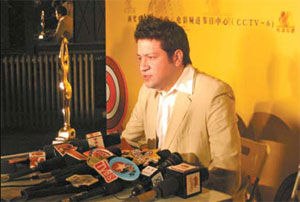| Home / Living in China / Expat Tales | Tools: Save | Print | E-mail | Most Read |
| Making It Short, Sweet and Sour |
| Adjust font size: |
The 11-minute film features a female bus driver who picks up a young male hitchhiker on a deserted country road. Although the man attempts to engage the driver in conversation, she's not interested, and he takes a seat. The next stop sees the bus boarded by two robbers who will test the character of everyone on the bus. The film starts all bright and breezy and takes a dark twist that is surprisingly brutal. "I have always been interested in social psychology and wanted to do a film about how people react under certain stressful circumstances," the director said. "The story attracts me not only because it has an interesting plot with a twist, but mostly because the underlying theme is even more haunting than the events that take place." He said he intentionally made this film with a certain ambiguity of time and place. "This story could have taken place anywhere in the world," he said. Bus 44 has won a string of plaudits from festivals around the world. It was the first Chinese short film to win an award at the Venice Film Festival and the Sundance Film Festival in 2001. Unfortunately, as there is essentially no market for short films in Eng's ability to tell stories in a fresh way might be attributed to his multi-ethnic family background. Born in "I grew up with two cultures and I'm using that to my advantage. But it's not intentional," he said. "My friends here laugh at something, and my friends in A While directing TV commercials in 1999, Eng completed the script of his first feature film Waiting Alone, and began shopping it around to production companies. "Besides writing and directing, I also had to turn into a producer because no one understood what I wanted to do with this film," he says. Though more people became interested in supporting Waiting Alone financially due to the success of Bus 44, it was still an uphill climb for "A lot of people think that movies about young people should cost a lot of money. It's just too fixed. So I ended up starting my own private production company to produce the film." Shooting for Waiting Alone finally began. The black comedy is about young people falling in love and stars Xia Yu, Gong Beibi (who also starred in Bus 44), Gao Qi, Li Bingbing and a group of older movie stars in small part appearances. Few so-called Chinese youth films succeed in moving beyond the underground genre, though the film won wide popularity among Chinese young people, especially university students. "Most of the films about youth in With his Bus 44 opened to the viewers, 30-year-old Eng has certainly gained acceptance and support from the local film industry, despite being a "foreign" director. "I don't think of myself as an American or a Chinese. I think people in the world have similarity to some extent," he said. "I want to be in the state of director Ang Lee, who can find his film angle both in ( |
| Tools: Save | Print | E-mail | Most Read |
 |
| Related Stories |
